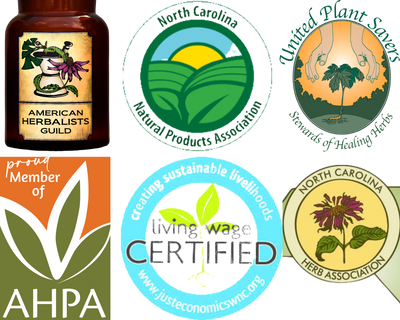Forsythia Flower Syrup

Mid to late March in Appalachia, most of the trees and spring ephemerals are still a few days or weeks off from popping, but forsythia is here in its sunny highlighter-yellow glory. In the news, we've seen a lot of talk of herbal preparations and one corner of the herb spotlight has shined down on sweet forsythia, the show-stopping ornamental herald of spring in so many rural and urban areas.

I've been experimenting this week with making a syrup of the flowers, since they're abundant around me right now, won't be available much longer, and I'm positing - based on anecdotes, a couple Chinese traditional health care text references, and taste - that they have some similar, though not identical, properties as the fruits. The flowers are labor-intensive to pick, but after enlisting my three-year-old's help we were able to pick over a cup of flowers in 20 minutes or so of delightful, meditative 'work'.

Forsythia Flower Syrup
1 to 1 1/2 cups fresh forsythia flowers (Forsythia suspensa)
1 1/4 cup boiling water
1/2 cup honey or agave (or other sweetener of choice)
Don't omit the most important step: inhaling the signature scent of your flowers once they're all gathered together. Is it not spring in a cup?!
Now that your olfactory senses are tickled, add your freshly plucked forsythia flowers to a clean glass jar and pour the boiling water over them so that they are covered. Steep covered 12 hours or overnight (once cooled down to room temperature, you can steep it in the fridge if you like), then strain and squeeze, discarding or composting the spent flowers. Add the honey or agave, stirring it into the liquid until it is well combined. Store in the fridge. Alternately, you could preserve it with a little alcohol (brandy or vodka would be nice) to make a shelf stable version (enough to make it at least 25% alcohol).
I'm freezing half my syrup and keeping half of it on hand in the fridge to sparingly stir into oatmeal, smoothie bowls, tea, or whatever else strikes my fancy. The taste is somewhat floral with a definite bitter edge. Benefits you can taste indeed.









Comments
Wendy C said:
Are all varieties of forsythia flowers edible? Thanks for the article.
Andrea said:
Forsythia, can be made in a tincture with alcohol . Or can it be made in a syrup.
Because what you have example with water is more like a infusion??
Thanks for your email. Very helpful. God bless
Sandra said:
Beautiful! Excited to try….
sharleen said:
thank you so much for the Forsythia recipe…
my backyard is bursting with the flowers now … I am going to share this with a few close friends who are ‘into’ herbal medicine and will appreciate it … i will tell them where I got the recipe … hope to check out your website later today after I do my work . . . I appreciate what you do for others and for Mother Earth
Rachel Swinney said:
HI, before I read today’s post, I learned about forsythia being good for lungs. I had not known this medicine before. So well over a week ago, I picked flowers. The only recipe I could find was to wilt the flowers, which I did in a hot car over 20 hours or so. Then I put those in a jar with several cloves of garlic and covered all with honey and let it sit on the counter for well over a week. Now that is the only recipe I found. I strained it today, and basically it is forsythia honey…the garlic can’t be tasted. I am keeping the honey refrigerated now. Very different from your process. What do you think?
Debbie Caldwell said:
!!😘💕Thank you😘💕!!